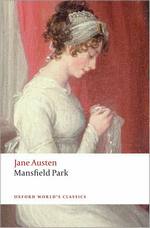 “Me!” cried Fanny…”Indeed you must excuse me. I could not act any thing if you were to give me the world. No, indeed, I cannot act.” Fanny Price, Chapter 15
“Me!” cried Fanny…”Indeed you must excuse me. I could not act any thing if you were to give me the world. No, indeed, I cannot act.” Fanny Price, Chapter 15
In a popularity poll of Jane Austen’s six major novels, Mansfield Park may come close to the bottom, but what a distinction that is in comparison to the rest of classic literature! Even though many find fault with its hero and heroine, its love story (or more accurately the lack of one), its dark subtext of abuse, neglect and oppression, and its overly moralistic tone, it is still Jane Austen; with her beautiful language, witty social observations and intriguing plot lines. Given the overruling benefits, I can still place it in my top ten all-time favorite classic books.
Considering the difficulty that some readers have in understanding Mansfield Park, the added benefit of good supplemental material is an even more important consideration in purchasing the novel. Recently I evaluated several editions of the novel currently in print which you can view here. For readers seeking a medium level of supplemental material, one solid candidate is the new reissue of Oxford World’s Classics (2008) which offers a useful combination of topics to expand on the text, place it in context to when it was written, and an insightful introduction by Jane Stabler, a Senior Lecturer in English at the University of Dundee, Scotland and Lord Byron scholar.
Understanding all the important nuances and inner-meanings in Mansfield Park can be akin to ‘visiting Pemberley’, the extensive estate of the wealthy Mr. Darcy in Jane Austen’s more famous novel Pride and Prejudice. One is intrigued by its renown but hard-pressed to take it all in on short acquaintance. The greatest benefit of the Oxford World’s Classics edition to the reader who seeks clarification is Jan Stabler’s thirty-page introduction which is thoughtfully broken down into six sub-categories by theme; The Politics of Home, Actors and Audiences, The Drama of Conscience, Stagecraft and Psychology, Possession, Restoration and Rebellion, and Disorder and Dynamism. Written at a level accessible to the novice and veteran alike, I particularly appreciate this type of thematic format when I am seeking an answer or explanation on one subject and do not have the time to wade through the entire essay at that moment. Her concluding lines seemed to sum up my recent feelings on the novel.
“The brisk restoration of order at Mansfield Park and healing of the breach between parent and child is underwritten by the same doubt that lingers around the last scene of Shakespeare’s King Lear: ‘Is this the promis’d end? (v. iii 262). Recreating the urge to defy parental authority while teaching us to sit still, and pitting unruly energy against patient submission to the rule of law, Mansfield Park is an enthralling performance of the competitive forces which governed early nineteenth-century politics, society and art.”
For me, Mansfield Park is about Jane Austen teaching this unruly child to sit still and enjoy the performance! With patience, I have come to cherish Fanny Price, the most virtuous and under-rated heroine in classic literature! Re-reading the novel and supplemental material was well worth the extra effort, expanding my appreciation of Austen’s skills as a storyteller and the understanding of the social workings in rural Regency England. I am never disappointed in her delivery of great quips such as
“But there certainly are not so many men of large fortune in the world as there are pretty women to deserve them.” The Narrator, Chapter 1
Also included in this edition are four appendixes; the first two on Rank and Social Status and Dancing which are included in all six of the Oxford World’s Classics Jane Austen editions and have been previously reviewed, followed by; Lovers’ Vows (the theatrical that the young people attempt to produce in the novel), and Austen and the Navy which helps the reader understand Jane Austen’s connection to the Royal Navy through her brothers James and Francis and its influence on her writing. The extensive Explanatory Notes to the text help place the novel in context for the modern reader while offering helpful and insightful nuggets of Regency information.
Mansfield Park may have the dubious distinction of being Jane Austen’s most challenging novel, but I have come to appreciate her characters and plot by a better understanding of the subtext through supplemental material and further re-readings of the novel. It is now one of my favorite Austen novels. Readers who hesitate to read Mansfield Park because of the ‘bad rap’ that it has received over the years are reminded of heroine Fanny Price’s excellent observation to the unprincipled character Henry Crawford, “We have all a better guide in ourselves, if we would attend to it, than any other person can be“. The Oxford World’s Classics Mansfield Park is certainly a fine edition to help you discover your own better inner-guide to the novel!
4 out of 5 Regency Stars
Read my previous reviews in the Oxford World’s Classics – Jane Austen Collection
 Oxford World’s Classics: Mansfield Park, by Jane Austen, edited by James Kinsley
Oxford World’s Classics: Mansfield Park, by Jane Austen, edited by James Kinsley
Oxford University Press, Rev. Ed. (2008)
Trade paperback (480) pages
ISBN: 978-0199535538
Cover image courtesy of Oxford University Press © 2008; text Laurel Ann Nattress, Austenprose.com
I am so pleased to hear you will doing this again and with Emma!
Thank you for all the hard work and research that you put into this blog!
LikeLike
It has always surprised me so much that so many people rate Mansfield Park as their least favorite Jane Austen novel, and that everyone dislikes Fanny so much. I think it was Lionel Trilling who said that no one has ever managed to like the heroine of Mansfield Park.
More to the topic at hand, I agree with Laurel that the organization of the Oxford World Classic’s introduction is an excellent idea, though I have always used the Norton Critical Edition myself, mainly because of all the supplementary material (the full text of Lovers’ Vows! Gah!).
What makes me so happy is that the Oxford edition is being reissued. Surely there is still hope for a world in which Jane Austen’s novels are still read and loved!
LikeLike
Laurel Ann wrote:
[i]Please join us for the next review of Emma in September[/i]
Pardon me, I think I read the quote wrong yesterday. It was a book review for Emma not another novel “Madness.” This is such a wonderful idea, reviewing/discussing the novel. I guess I just want more! Sorry the the miss-interpretation. :)
LikeLike
I read the quote wrong as well and was excited for a minute there. It’s been really interesting getting so many views on MP and I’ve enjoyed coming to this site to read all the comments.
LikeLike
This is off topic, but the kitty in the Oxford box is adorable.
LikeLike
Hello Mansfield Park Madness participants day 13
Felicia & Marsha – Just to clarify, I will be reviewing the Oxford edition of Emma next month. I hope to do another in-depth event of another of Jane Austen’s novels maybe next year again. Thanks for your encouragement.
Dae – just to confirm, as a professional bookseller I can share that Jane Austen is read and appreciated by many. I just hope that a few more readers were gathered to MP by my efforts here.
Susan – Molly the Oxford scholar kitty in the box sends her thanks. Since climbing in the box allowed her magically to absorb all of the novels & supplemental material, she is my advisor on Jane Austen now!
Cheers, Laurel Ann
LikeLike
Thank you. I do look forward to the coming Emma blogging.
LikeLike